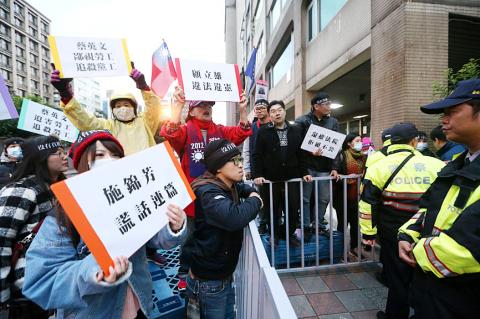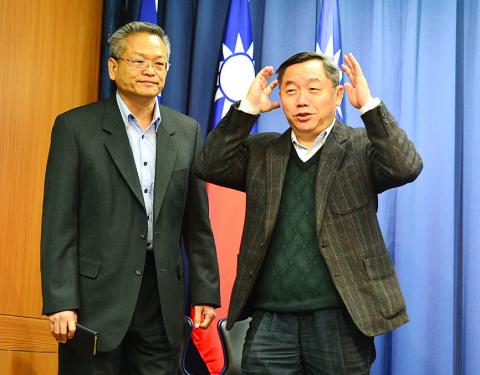The Taipei High Administrative Court yesterday ruled in favor of the Chinese Nationalist Party (KMT), suspending the transfer to the state of Central Investment Co (中央投資公司) and Hsinyutai (欣裕台) shares held by the party.
After the announcement, KMT officials claimed victory in their battle against the Cabinet’s Ill-gotten Party Assets Settlement Committee, which is headed by Wellington Koo (顧立雄).
The committee concluded that Central Investment and Hsinyutai are KMT-affiliated organizations and shares valued at about NT$15.6 billion (US$488 million) should be transfered to the state since the companies were founded using illegally obtained assets.

Photo: CNA
The committee had a letter of deposition sent to the KMT last month, giving the party 30 days to comply with the assets transfer. The party filed a court motion to block the request before a final verdict was handed down.
“The shares could be put up for open bidding or passed on to management by a third party,” said Hsu Jui-chu (許瑞助), the presiding judge and spokesman for the Taipei High Administrative Court. “However, if the KMT wins the case, then they would have lost money making the transfer. If the KMT were to be compensated for that loss, it would be a large amount to be settled.”
“If the companies were to be sold or transferred to a third party before a final verdict, then it would lead to complex legal problems, and could result in disputes, which would waste public resources. Therefore, the court has ruled to suspend the transfer of the company’s shares to the state,” Hsu said.

Photo: Wang Yi-sung, Taipei Times
Yesterday’s decision can be appealed.
In response to the ruling, Koo said it reaffirmed the committee’s conclusion that the KMT’s shares in the two investment firms were acquired using ill-gotten assets.
Quoting the court’s news release, Koo said that if the committee’s conclusion had been overturned, it would likely create a loophole whereby the two companies could divest themselves of their assets, which would defeat the purpose of the Act Governing the Handling of Ill-gotten Properties by Political Parties and Their Affiliate Organizations (政黨及其附隨組織不當取得財產處理條例), which is meant to ensure fair competition among political parties, thus improving the nation’s democratic system.

Photo: Huang Hsin-po, Taipei Times
“The KMT should stop benefiting from Central Investment and Hsinyutai. The ruling means that the KMT should neither transfer nor use the shares, effectively freezing them,” Koo said.
As to remarks by KMT Administration and Management Committee director Chiu Da-chan (邱大展) that Koo should stand down from his duties as committee chairman over the ruling, Koo said the media should ask Chiu whether the KMT would accept the court’s affirmation that the KMT shares were illegal assets as defined by the law.

The US government has signed defense cooperation agreements with Japan and the Philippines to boost the deterrence capabilities of countries in the first island chain, a report by the National Security Bureau (NSB) showed. The main countries on the first island chain include the two nations and Taiwan. The bureau is to present the report at a meeting of the legislature’s Foreign Affairs and National Defense Committee tomorrow. The US military has deployed Typhon missile systems to Japan’s Yamaguchi Prefecture and Zambales province in the Philippines during their joint military exercises. It has also installed NMESIS anti-ship systems in Japan’s Okinawa

‘WIN-WIN’: The Philippines, and central and eastern European countries are important potential drone cooperation partners, Minister of Foreign Affairs Lin Chia-lung said Minister of Foreign Affairs Lin Chia-lung (林佳龍) in an interview published yesterday confirmed that there are joint ventures between Taiwan and Poland in the drone industry. Lin made the remark in an exclusive interview with the Chinese-language Liberty Times (the Taipei Times’ sister paper). The government-backed Taiwan Excellence Drone International Business Opportunities Alliance and the Polish Chamber of Unmanned Systems on Wednesday last week signed a memorandum of understanding in Poland to develop a “non-China” supply chain for drones and work together on key technologies. Asked if Taiwan prioritized Poland among central and eastern European countries in drone collaboration, Lin

Renewed border fighting between Thailand and Cambodia showed no signs of abating yesterday, leaving hundreds of thousands of displaced people in both countries living in strained conditions as more flooded into temporary shelters. Reporters on the Thai side of the border heard sounds of outgoing, indirect fire yesterday. About 400,000 people have been evacuated from affected areas in Thailand and about 700 schools closed while fighting was ongoing in four border provinces, said Thai Rear Admiral Surasant Kongsiri, a spokesman for the military. Cambodia evacuated more than 127,000 villagers and closed hundreds of schools, the Thai Ministry of Defense said. Thailand’s military announced that

CABINET APPROVAL: People seeking assisted reproduction must be assessed to determine whether they would be adequate parents, the planned changes say Proposed amendments to the Assisted Reproduction Act (人工生殖法) advanced yesterday by the Executive Yuan would grant married lesbian couples and single women access to legal assisted reproductive services. The proposed revisions are “based on the fundamental principle of respecting women’s reproductive autonomy,” Cabinet spokesperson Michelle Lee (李慧芝) quoted Vice Premier Cheng Li-chiun (鄭麗君), who presided over a Cabinet meeting earlier yesterday, as saying at the briefing. The draft amendment would be submitted to the legislature for review. The Ministry of Health and Welfare, which proposed the amendments, said that experts on children’s rights, gender equality, law and medicine attended cross-disciplinary meetings, adding that